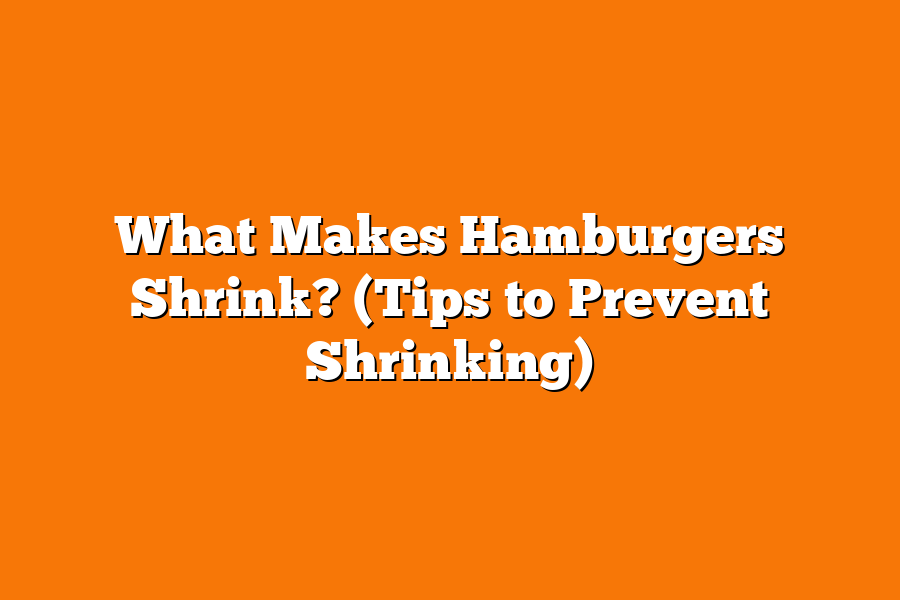Hamburgers shrink primarily due to the loss of moisture during the cooking process. As the burger cooks, the heat causes the proteins in the meat to contract, squeezing out water. Additionally, the fat content in the meat also renders out during cooking, contributing to the shrinkage. Choosing leaner cuts of meat or adding breadcrumbs or binders can help reduce shrinkage while cooking.
Get ready to solve the mystery of burger shrinkage and level up your grill game!
Dive into the science behind shrinking patties and discover practical tips to keep your burgers juicy and delicious.
Let’s grill and chill our way through preventing burger shrinkage together!
Table of Contents
Understanding the Science Behind Burger Shrinkage
Have you ever grilled up some perfectly shaped burger patties, only to watch them shrink into smaller, thicker discs as they cook?
It’s a common frustration for many grill masters, but fear not – there’s science behind this phenomenon.
Let’s dive into why hamburgers shrink during cooking.
The Role of Fat Content
One of the primary factors contributing to burger shrinkage is the fat content in the meat.
When heat is applied to the patty, the fat starts to render out, causing the patty to contract and shrink in size.
According to a study by America’s Test Kitchen, burgers that were 20% fat experienced the most shrinkage compared to leaner options.
Water Loss and Protein Coagulation
As the burger cooks, it loses water content through evaporation.
This water loss, combined with the denaturation and coagulation of proteins in the meat, leads to further shrinkage.
This process is essential for developing that juicy, flavorful interior, but it does come at the cost of some size reduction.
The Maillard Reaction
When the surface of the patty reaches around 310°F (154°C), the Maillard reaction kicks in.
This chemical reaction between amino acids and reducing sugars not only creates that crave-worthy crispy crust and deep flavor but also causes the meat to contract and shrink slightly.
The Influence of Cooking Method
The way you cook your burgers can also impact shrinkage.
For example, grilling over direct high heat can lead to more shrinkage compared to a gentler cooking method like sous vide.
Understanding how different cooking techniques affect shrinkage can help you adjust your approach based on your desired outcome.
Practical Tips to Minimize Shrinkage
While some shrinkage is inevitable, there are a few strategies you can employ to minimize the loss:
- Choose the Right Fat Content: Opt for a leaner meat blend if you want to reduce shrinkage.
- Uniform Thickness: Ensure your patties are of even thickness to promote even cooking and minimize disproportionate shrinkage.
- Don’t Overhandle: Excessive handling of the meat can lead to denser patties, which are more prone to shrinkage. Form your patties gently.
- Rest Before Cooking: Letting your patties rest at room temperature before cooking can help reduce the temperature gradient and minimize shrinkage.
By understanding the factors at play and implementing these tips, you can better control burger shrinkage and achieve delicious, perfectly cooked patties for your next barbecue.
Stay tuned for more insights on mastering the art of burger perfection!
Factors Contributing to Burger Shrinkage
Have you ever grilled up a perfectly shaped burger patty, only to watch it shrink into a smaller, thicker version of its former self?
It’s a common burger woe that many backyard chefs face.
But fear not, as I’m here to break down the factors that contribute to burger shrinkage.
Let’s dive in:
1. Fat Content:
The fat content in your ground beef plays a significant role in how much your burger will shrink during cooking.
When fat renders and drips out of the patty while grilling, it causes the meat to shrink.
An 80/20 blend (80% lean meat, 20% fat) is a popular choice for juicy burgers, but keep in mind that higher fat content can lead to more shrinkage.
2. Overworking the Meat:
It may be tempting to go all out with the seasoning and mix-ins when forming your burger patties, but overworking the meat can actually contribute to shrinkage.
When the meat is excessively handled and compressed, it can lead to a denser patty that shrinks more during cooking.
Keep it simple and handle the meat gently for a more tender patty.
3. Cooking Method:
The way you cook your burgers can also impact how much they shrink.
Grilling over high heat can result in faster shrinkage as the moisture escapes quickly.
On the other hand, pan-searing at a lower heat may reduce shrinkage by allowing the patty to cook more evenly without losing as much moisture.
4. Patty Thickness:
The thickness of your burger patty can affect how much it shrinks while cooking.
Thicker patties tend to retain more moisture and shrink less compared to thinner ones.
Aim for a balance between thickness and diameter to avoid excessive shrinkage.
5. Salt:
While salt is essential for flavoring your burger, using too much salt in the meat mixture can cause it to break down proteins and bind more tightly, leading to shrinkage.
Be mindful of the salt content in your seasoning to prevent excessive patty shrinkage.
By understanding these factors that contribute to burger shrinkage, you can take control of your grilling game and serve up perfectly juicy burgers every time.
Experiment with different fat blends, cooking methods, and patty thickness to find the perfect balance for your ideal burger patty.
Stay tuned for more tips to level up your burger game!
Practical Tips to Prevent Hamburgers from Shrinking
When it comes to grilling up juicy and flavorful hamburgers, nothing is more disappointing than watching your patties shrink down to tiny sliders right before your eyes.
But fear not, there are practical tips you can implement to prevent this culinary tragedy from happening.
Let’s dive into some tried-and-true methods to keep your burgers plump and delicious:
1. Choose the Right Meat Blend
The type of meat you use for your burgers can significantly impact their shrinkage during cooking.
Opt for cuts with a higher fat content, such as ground chuck (around 15-20% fat), which will help your burgers retain moisture and prevent excessive shrinking.
Leaner meats, like ground sirloin, tend to lose more moisture and shrink more as they cook.
2. Handle the Meat Gently
When forming your burger patties, handle the meat as little as possible.
Overworking the meat can lead to a denser texture and result in more shrinkage during cooking.
Use a light touch to form the patties, and avoid pressing down on them too firmly, as this can squeeze out the juices and cause shrinkage.
3. Create an Indentation
To prevent your burger patties from puffing up in the middle and shrinking around the edges, create a slight indentation in the center of each patty before grilling.
This simple trick helps the burgers cook more evenly, maintaining their shape and juiciness throughout the process.
4. Avoid Flipping Too Often
While it may be tempting to constantly flip your burgers on the grill, resist the urge.
Flipping the patties too frequently disrupts the cooking process and can lead to loss of moisture, resulting in shrinkage.
Aim to flip your burgers only once during cooking to ensure they retain their juiciness and size.
5. Use High Heat
Cooking hamburgers over high heat can help them develop a flavorful sear on the outside while locking in moisture.
A hot grill or skillet will quickly caramelize the exterior of the patties, creating a tasty crust that enhances the overall juiciness of the burgers.
High heat also helps cook the burgers quickly, minimizing the time for moisture loss and shrinkage.
By following these practical tips, you can take control of the shrinking phenomenon and ensure that your hamburgers stay plump, juicy, and delicious every time you grill.
Remember, the key to preventing shrinkage lies in choosing the right meat, handling it gently, and employing smart cooking techniques.
So fire up the grill, put these tips to the test, and enjoy perfectly sized burgers at your next cookout!
Why Do Hamburgers Shrink?
Have you ever grilled up a juicy burger only to watch it shrink into a small patty before your eyes?
It can be a frustrating experience, but fear not, as I am here to uncover the reasons behind this phenomenon.
Let’s dive in and explore the factors that contribute to hamburger shrinkage.
1. The Meat Composition
When it comes to burger shrinkage, the type of meat you use plays a significant role.
Different meats have varying fat content, which can impact how much the patty shrinks during cooking.
For example, a higher fat content in the meat leads to more shrinkage as the fat melts away.
On the other hand, leaner meat may result in less shrinkage due to less fat rendering out.
2. Cooking Method
The way you cook your burger also influences shrinkage.
For instance, grilling over direct heat can cause more fat to drip out compared to cooking in a pan.
This loss of fat contributes to the shrinkage of the patty.
Additionally, pressing down on the burger while cooking can force out more juices, further reducing the size of the patty.
3. Temperature Management
Proper temperature control is key to minimizing shrinkage.
Cooking burgers at too high a temperature can cause them to cook too quickly, leading to excessive shrinkage.
It’s essential to find the right balance and cook the patty evenly to retain as much moisture as possible and prevent unnecessary shrinkage.
4. Patty Size and Thickness
The size and thickness of the patty can also impact shrinkage.
Thicker patties are more likely to retain moisture and juices, resulting in less shrinkage compared to thin patties.
Additionally, larger patties may shrink more proportionally during cooking due to the surface area’s exposure to heat.
Real-life Examples and Personal Experiences
To bring these factors to life, let me share a personal experience.
During a BBQ cookout last summer, I noticed that the burgers made with lean ground beef retained their shape better and experienced less shrinkage compared to those made with a higher fat content.
This observation highlights the role of meat composition in hamburger shrinkage and emphasizes the importance of choosing the right meat for your patties.
In addition, using a meat thermometer to ensure proper cooking temperature can make a significant difference in the final size of your burger.
By monitoring the internal temperature, you can prevent overcooking and excessive shrinkage, resulting in a juicier and more substantial patty.
By considering these factors and incorporating best practices in your burger-making process, you can minimize shrinkage and enjoy delicious, perfectly sized burgers every time.
Keep these tips in mind for your next grilling adventure, and say goodbye to tiny, shrunken patties!
Final Thoughts
Mastering the art of burger-making involves understanding the ins and outs of why hamburgers shrink during cooking.
By delving into the science behind burger shrinkage and exploring the factors that contribute to this phenomenon, such as fat content, cooking temperature, and handling techniques, you’re equipped with the knowledge to prevent shrinkage and elevate your burger game.
To ensure your next cookout leaves guests impressed, remember to implement the practical tips shared in this guide.
Whether it’s incorporating leaner meat blends, adjusting cooking methods, or refining your patty shaping technique, small changes can make a big difference in preserving the size and juiciness of your burgers.
As you venture into the world of burger making armed with these newfound insights, don’t forget to experiment and find what works best for you.
Every grill session presents an opportunity to hone your skills, so embrace the process and enjoy the delicious results.
Now, it’s time to fire up the grill, put these tips into action, and savor the satisfaction of crafting perfectly sized, mouthwatering burgers.
Happy grilling!

